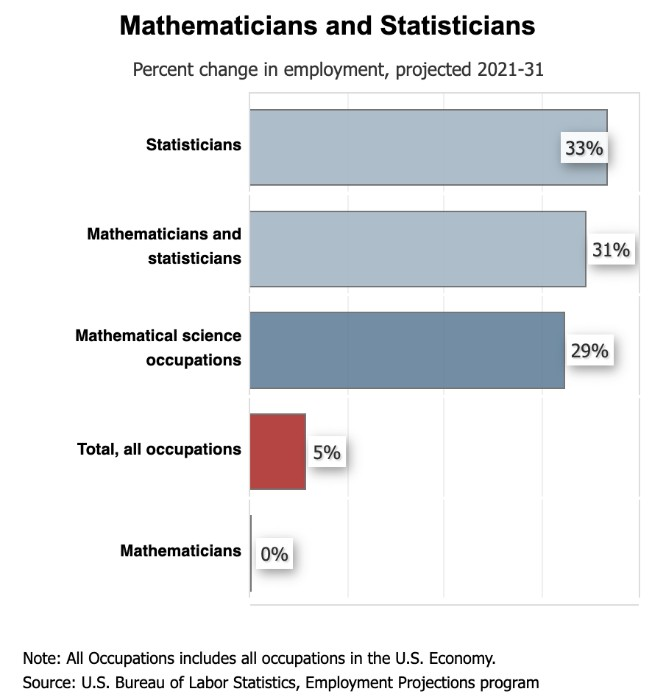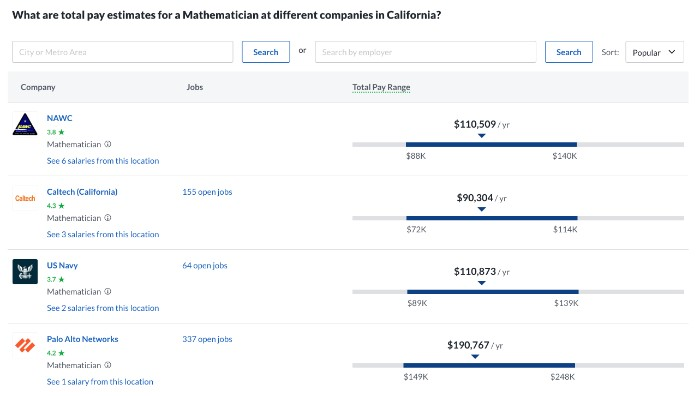What Can You Do With A Mathematics Degree?
If you assess yourself as someone good with numbers, there’s a fat chance you are gunning for a Mathematics degree. Putting this skill into good use can lead to many opportunities, career progression or a good-paying job.
This article will provide you with a comprehensive review about Mathematics degree, career path, job outlook, satisfaction and current salary trends. Through these metrics, we are hoping to answer this question: is taking a Math degree worth the investment?
What Is A Mathematics Degree?

A Mathematics degree is an undergraduate course that focuses on the general and fundamental concepts of mathematics. It includes a wide range of topics like mathematical theories, methods, operations as well as problem-solving skills and mathematical reasoning.
Those who pursue a Math degree have to study courses such as algebraic structures, calculus, trigonometry, geometry, statistics and number theory. In addition, Math-related topics such as actuarial science, computer science and engineering may be included to enhance the Mathematics degree program.
How Long Can You Finish A Mathematics Degree?
Generally, a Mathematics degree takes around four years to complete. However, some universities may require students to finish more academic credits. Those who are enrolled in an accelerated program may also be able to finish their Math degree earlier than the usual time frame.
Career Path and Job Market Demand For Mathematics Degree Graduates
General Score for Career Path and Job Market Demand: 9.5/10
The demand for mathematicians and statisticians is expected to grow by 31% from 2021 to 2031, much faster than the average for all occupations. This growth will create an average of 4,100 new jobs each year. Many of these new jobs will be needed to replace workers who leave the occupation, such as to retire or to take other jobs.
Here are some of the reasons for the expected growth in demand for mathematicians and statisticians:
- The increasing use of data in all aspects of society, from business to government to healthcare, is driving demand for these workers.
- The increasing complexity of the world is making it more important to have workers who can use mathematics and statistics to solve problems.
- The growing popularity of data science is creating new opportunities for mathematicians and statisticians.

What Jobs Can You Get With a Math Degree?
Mathematics majors can find jobs in a variety of sectors, such as banking and finance, education, consulting, engineering, technology and research.
Some of the specific job titles for mathematics degree holders include: Data Scientist, Actuarial Analyst, Financial Analyst, Software Developer, Statistician and a Mathematician.
Job Outlook After Completing the Mathematics Degree
General Score for Job Outlook: 9.5/10
The projected employment of mathematicians and statisticians varies by occupation. The table below from the US shows the projected employment growth for each occupation.

The growth in employment for statisticians is expected to be driven by the increasing use of statistical analysis in business, healthcare, and policy decisions. As the amount of data collected by businesses and organizations continues to grow, there will be a greater need for statisticians to analyze this data and make sense of it.
Statistical analysis can help businesses improve their business processes, design and develop new products, and advertise products to potential customers. It can also help healthcare providers improve the quality of care they provide and make better decisions about patient care. In the field of policy, statistical analysis can help policymakers make informed decisions about public policy.
Average Salary of Math Majors
General Score for Salary: 9.5/10
In May 2021, the median annual wage for mathematicians was $108,100, according to BLS. This means that half of all mathematicians earned more than $108,100, and half earned less. The lowest 10% of mathematicians earned less than $61,760, and the highest 10% earned more than $169,500.
The median annual wage for statisticians in May 2021 was $95,570. This means that half of all statisticians earned more than $95,570, and half earned less. The lowest 10% of statisticians earned less than $49,350, and the highest 10% earned more than $157,300.
As you can see, the median annual wage for both mathematicians and statisticians is quite high. This means that these are both very well-paying occupations. However, it is important to note that the salaries for these occupations can vary widely, depending on a number of factors, such as experience, education, and location.
As an illustration, here’s the user-reported salary range sourced from Glassdoor, reflecting the average pay in leading companies in the State of California:

It’s also worth noting that nationwide, here are the top industries where Math degree holders are concentrated in:

Mathematics graduates can thus capitalize on their solid foundation on mathematical concepts, including applied mathematics, linear algebra, complex and numerical analysis,, intermediate calculus, financial data, differential geometry, quantum mechanics, and more.
Are Math Majors Happy and Satisfied At Work?
General Score for Job Outlook: 7.5/10
Mathematicians rate their career happiness 3.6 out of 5 stars, according to Career Explorer. This puts them in the top 27% of careers. As you can see, mathematicians are generally happier than most other professionals in the industry. This is likely due to the fact that they find their work to be challenging, rewarding, and intellectually stimulating.
Of course, not all mathematicians are happy at work. Some mathematicians find the work to be too challenging or too demanding. Others find that they are not as good at pure math as they thought they were. However, for the most part, mathematicians are happy and satisfied at work.
How Do Mathematicians Fare In The Real World?
Students pursuing Math degrees must find this section interesting as it will guide their decision points whether to take a Mathematics degree or not. Here’s what I found out on Reddit about this bachelor’s degree:
Is a Math Degree Worth Your While?
Interestingly, here’s what I found about math majors who thrived in this bachelor’s degree:
Some are not mincing their words about taking a math major:
Torn Between Computer Science and A Mathematics Degree?
Here’s some practical advice about choosing between Computer Science and a Mathematics degree:
Is A Bachelor’s Degree in Mathematics For You? (Factors to Consider)
Before you decide to pursue a Mathematics degree, it’s crucial to assess if it aligns with your interests and abilities. Mathematics is a demanding field that demands substantial effort and commitment. To help you make an informed decision, here is a checklist to consider:
| YES | NO | |
| Clarity of Career Goals: Are you clear about your career goals before taking a Bachelor’s degree in Mathematics? | ||
| Job Market Competitiveness: Is the job market for mathematics graduates competitive? Do you find this as something you are ready to explore? | ||
| Level of Prerequisite Knowledge: Can you cope up to the certain level of mathematical knowledge and ability required to excel in a mathematics degree program? | ||
| Course Requirements Difficulty: Can I hurdle the specific courses required for a mathematics degree, given that they are challenging? | ||
| Faculty Expertise Relevance: Do the faculty members in the mathematics department have areas of expertise that can support your learning? | ||
| Availability of Research Opportunities: Are you yearning for research opportunities available for mathematics undergraduates? | ||
| Emphasis on Collaborative Learning: Are you okay with collaborative learning as emphasized in the mathematics program? | ||
| Time Commitment Required: Will completing a mathematics degree require a significant time commitment? | ||
| Job Market Competitiveness: Is the job market for mathematics graduates competitive? | ||
| Financial Cost: Am I ready financially? | ||
| Extracurricular Activity Availability: Are you excited about the extracurricular activities available for mathematics students? |
If you answered “yes” to most of the questions above, then a mathematics degree may be a good fit for you. However, if you answered “no” to most of the questions, then you may want to reconsider your plan of taking a mathematics degree.
It is important to remember that a mathematics degree is a challenging and demanding program. If you are not prepared to put in the hard work and dedication required to succeed, then you may want to consider a different degree program. Ultimately, the decision of whether or not to pursue a mathematics degree is up to you. However, I hope that this checklist has given you some food for thought.

Factors to Consider in Choosing the Best School for a Mathematics Degree
Here are some suggestions on how to choose the appropriate school to take a Mathematics degree:
Consider your interests and goals
What are you interested in studying? What are your career goals? Choose a school that has a strong program in the areas of mathematics that you are interested in.
Research the school’s reputation
Look at the school’s rankings, graduation rates, and student satisfaction ratings. Talk to current students and alumni to get their feedback on the school.
Consider the cost
The cost of tuition, room and board, and other expenses can vary widely from school to school. Make sure to factor in the cost of attendance when making your decision.
Get financial aid
There are a variety of financial aid options available to help you pay for college. Do your research and apply for as many scholarships and grants as you can.
FAQs about Mathematics Degree
What are the requirements for a Mathematics Degree?
The requirements for a Mathematics Degree vary from school to school. However, most programs require students to take courses in algebra, calculus, geometry, and statistics. Some programs may also have advanced courses that require students to take courses in discrete mathematics, linear algebra, and probability theory.
Can You Get a Mathematics Degree Online?
Yes, there are many online Mathematics Degree programs available. Many of these programs offer an interactive learning experience with exercises and practice problems to help students better understand the material. Online degrees also typically have flexible schedules and lower tuition costs than traditional on-campus associate degree programs.
What Skills do you need for a Mathematics Degree?
In order to successfully complete a Mathematics Degree, Math students must have strong analytical and problem-solving skills. Additionally, they should be comfortable working with numbers and equations and have an understanding of mathematical concepts such as calculus, algebra, geometry, probability, and statistics. Good communication skills are also necessary to effectively explain various mathematical principles and concepts.
Pros and Cons about Math Degree
Whether or not a Mathematics Degree is worth it depends on your individual goals and circumstances. If you are interested in a career in a field that requires strong math skills, then a Mathematics Degree may be a good fit for you. However, if you are not interested in a career in a math-related field, then a Mathematics Degree may not be worth the time and effort.
Here are some of the pros and cons of getting a Mathematics Degree:
Pros:
- Mathematics is a fundamental subject that is used in many different fields.
- A Mathematics Degree can help you develop strong problem-solving and analytical skills.
- A Mathematics Degree can open up a variety of career opportunities.
- The salary prospects for someone with a Mathematics Degree are good.
Cons:
- Mathematics can be a challenging subject.
- Mathematics degrees can be demanding.
- Mathematics degrees can be expensive.
- Mathematics degrees may not be the best fit for everyone.
Final Verdict for the Math Degree
Here’s my final assessment about the Math degree:
Salary: 9.5/10
Labor statistics point to a very promising salary progression in the job market for Math degree graduates. As evidenced by the data about Mathematics degree jobs above, student with a degree in math are most likely to score well-paying jobs, making their four-year investment for this degree worthwhile. The advanced mathematics curriculum will be a good foundation for any mathematics major land well-paying and in-demand jobs.
Satisfaction: 7.5/10
Students interested in taking this degree will find consolation that math majors are among the satisfied workers in the job market today. Academic careers, including those borne out of math degrees, tend to be happier and more satisfied at work. It seems that analyzing data, complex variables, and developing financial and mathematical models all seem to be a piece of cake among math majors.
Demand: 9.5/10
The demand for graduates of math degrees is projected to grow year on year. This is enough reason why taking not only a math degree, but also a master’s degree and a doctoral degree, can lead to multiple returns years after graduation.
X-Factor: 9/10
The skill set you will be able to get in studying Mathematical theory analysis, applied mathematics, computer programming, algebra, and quantitative predictions will afford you with a very comprehensive resume that will make companies go after you. This X-factor will definitely make you laugh all the way to the bank later on.

Over-All Score: 8.625/10
Given the job market demand, salary potential, and satisfaction of pursuing a Math degree, I can safely say that getting a Mathematics Degree is an excellent investment for your future. Not only will it open up career opportunities in many different fields, but you’ll also have the knowledge and skills to be successful in whatever you choose to pursue.
If you’re interested in a career that requires strong analytical and problem-solving skills, then a Mathematics Degree is definitely worth considering. And if you put forth the time and effort to learn all the concepts and material, it will certainly pay off in the long run.
Alternatives to a Mathematics Degree
If you’re looking for an alternative to the traditional degree path, then there are other options available for those who wish to pursue engineering careers, that require strong math skills.
For instance, some people may choose to take online courses such as tech sales BootCamp or attend specialized coding boot camps in order to gain the skills necessary to become proficient in coding, data science, and other math-related fields. These alternate paths can be an excellent way to gain valuable knowledge and experience while avoiding the costs associated with a full degree program.
Overall, there is no single right or wrong answer when deciding whether or not a Mathematics Degree is worth pursuing. It ultimately depends on your particular skills and goals, and what you are willing to put into it. But in the end, with the right amount of work and dedication, a Mathematics Degree can open up a variety of career opportunities that have the potential for great rewards.

… [Trackback]
[…] Find More Information here on that Topic: shanehummus.com/college-degrees/mathematics-degree/ […]
… [Trackback]
[…] Find More on on that Topic: shanehummus.com/college-degrees/mathematics-degree/ […]
… [Trackback]
[…] Information to that Topic: shanehummus.com/college-degrees/mathematics-degree/ […]
… [Trackback]
[…] Here you will find 4623 additional Information on that Topic: shanehummus.com/college-degrees/mathematics-degree/ […]
… [Trackback]
[…] Find More on on that Topic: shanehummus.com/college-degrees/mathematics-degree/ […]
… [Trackback]
[…] Find More Info here on that Topic: shanehummus.com/college-degrees/mathematics-degree/ […]
… [Trackback]
[…] Find More on on that Topic: shanehummus.com/college-degrees/mathematics-degree/ […]
… [Trackback]
[…] Info on that Topic: shanehummus.com/college-degrees/mathematics-degree/ […]
… [Trackback]
[…] Find More here to that Topic: shanehummus.com/college-degrees/mathematics-degree/ […]
… [Trackback]
[…] Here you will find 8137 additional Information on that Topic: shanehummus.com/college-degrees/mathematics-degree/ […]
… [Trackback]
[…] Find More to that Topic: shanehummus.com/college-degrees/mathematics-degree/ […]
… [Trackback]
[…] Info on that Topic: shanehummus.com/college-degrees/mathematics-degree/ […]
… [Trackback]
[…] Information to that Topic: shanehummus.com/college-degrees/mathematics-degree/ […]
… [Trackback]
[…] Read More here to that Topic: shanehummus.com/college-degrees/mathematics-degree/ […]
… [Trackback]
[…] Find More Info here to that Topic: shanehummus.com/college-degrees/mathematics-degree/ […]
… [Trackback]
[…] Read More Information here on that Topic: shanehummus.com/college-degrees/mathematics-degree/ […]
… [Trackback]
[…] There you can find 64354 more Info to that Topic: shanehummus.com/college-degrees/mathematics-degree/ […]
… [Trackback]
[…] Information on that Topic: shanehummus.com/college-degrees/mathematics-degree/ […]
… [Trackback]
[…] Find More here on that Topic: shanehummus.com/college-degrees/mathematics-degree/ […]
… [Trackback]
[…] Here you can find 48921 additional Info to that Topic: shanehummus.com/college-degrees/mathematics-degree/ […]